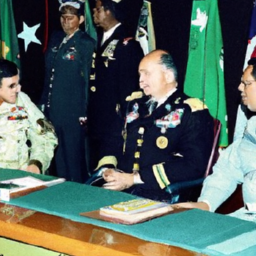In a recent statement that has garnered significant attention, former U.S. President Donald Trump praised Pakistans Chief of Army Staff, General Asim Munir, for his role in averting a potential conflict between India and Pakistan. Trump claimed that Munirs actions saved millions of lives, describing the situation as beautiful. This assertion raises important questions about the geopolitical dynamics in South Asia, the role of military leadership in conflict resolution, and the implications for U.S.-Pakistan relations. To understand the context of Trumps remarks, it is essential to consider the historical backdrop of India-Pakistan relations. Since their partition in 1947, the two nations have experienced several military confrontations and ongoing tensions, primarily over the Kashmir region. The conflict has led to multiple wars and a continuous military standoff, with both countries possessing nuclear weapons. In my experience, the volatility of this relationship has made it a focal point for international diplomacy, particularly for the United States, which has often acted as a mediator. General Asim Munir, who took command of the Pakistan Army in November 2022, has been instrumental in shaping Pakistans military strategy and foreign policy. His leadership comes at a time when Pakistan faces numerous challenges, including economic instability and internal security threats. Observations indicate that Munir has sought to stabilize the region through dialogue and strategic partnerships, particularly with neighboring countries. His approach appears to align with Trumps assertion that he played a crucial role in preventing conflict. Experts agree that military leaders can significantly influence diplomatic outcomes. Studies show that effective communication and negotiation skills are vital for military officials engaged in conflict resolution. Munirs background, which includes experience in intelligence and counter-terrorism, suggests that he possesses the necessary expertise to navigate complex geopolitical landscapes. Furthermore, industry experts note that his leadership style emphasizes collaboration and understanding, which may have contributed to de-escalating tensions with India. Trumps comments also reflect a broader trend in U.S. foreign policy, where the emphasis has shifted towards engaging with military leaders in countries like Pakistan. According to official reports, the U.S. has historically relied on military partnerships to maintain stability in South Asia. This approach has been met with mixed results, as it often overlooks the political and social dimensions of conflicts. Nevertheless, Trumps praise for Munir indicates a recognition of the importance of military leadership in fostering peace. In terms of data, government reports show that the economic costs of conflict in the region are staggering. The ongoing tensions between India and Pakistan have resulted in significant military expenditures and lost opportunities for development. Trumps assertion that millions were saved by Munirs actions underscores the potential benefits of diplomatic engagement over military confrontation. This perspective aligns with research that highlights the economic advantages of peace, including increased trade and investment. However, it is essential to approach Trumps comments with a critical lens. While his praise for Munir may be well-intentioned, it raises questions about the complexities of the India-Pakistan relationship. The notion that one individual can single-handedly avert conflict oversimplifies the multifaceted nature of international relations. Multiple sources confirm that peace in the region requires a concerted effort from various stakeholders, including political leaders, civil society, and international organizations. Moreover, the implications of Trumps remarks extend beyond the immediate context of India and Pakistan. As the U.S. navigates its foreign policy priorities, the relationship with Pakistan remains a crucial element in addressing broader security challenges, including counter-terrorism and regional stability. Experts suggest that maintaining open lines of communication with military leaders like Munir could facilitate more effective collaboration on these issues. Looking ahead, the future of India-Pakistan relations remains uncertain. While Munirs leadership may contribute to a more stable environment, the underlying issues that fuel tensions between the two nations persist. Research confirms that unresolved territorial disputes, historical grievances, and nationalistic sentiments continue to pose significant challenges. Therefore, it is imperative for both countries to engage in sustained dialogue and seek mutually beneficial solutions. In conclusion, Donald Trumps remarks regarding General Asim Munir highlight the critical role of military leadership in conflict resolution and the importance of diplomatic engagement in South Asia. While Munirs actions may have contributed to averting immediate conflict, the complexities of the India-Pakistan relationship necessitate a comprehensive approach that involves multiple stakeholders. As the U.S. continues to navigate its foreign policy in the region, fostering collaboration with military leaders like Munir could prove essential in promoting long-term peace and stability. The implications of these dynamics will undoubtedly shape the geopolitical landscape of South Asia for years to come.
TRENDING NOW
WORLD
Global Messaging Trends: Can Local Apps Like Arattai Overtake Giants?
44% 🔥
POLITICS
Accusations fly over whether Republicans or Democrats 'own' shutdown
35% 🔥
POLITICS
Rep. Mike Haridopolos, R-Fla., talks about the government shutdown
34% 🔥
POLITICS
What happens now that the government has shut down. And, a pricing deal with Pfi...
26% 🔥
POLITICS
Married, but no connection: Reality of silent divorces in Indian homes
31% 🔥
POLITICS
Netanyahu's apology to Qatar, phone on Trump's lap: A telling White House photo
38% 🔥
MOST READ
SPORTS
Week 5 NFL odds, lines, betting picks, spreads: 2025 predictions: Model backs Sa...
55% 🔥
SPORTS
Predicting every undefeated college football team's first loss: Will anyone beat...
36% 🔥
SPORTS
Tigers Lefty Tarik Skubal Deserves Second Straight AL Cy Young Award
54% 🔥
SPORTS
Jets Get Official Braelon Allen Injury Diagnosis
61% 🔥
SPORTS
Gill: India won't be 'looking for any easy options' against West Indies
49% 🔥
SPORTS
Phil Mickelson takes a jibe at golf during friendly banter with ex-LIV Golf CEO’...
39% 🔥

